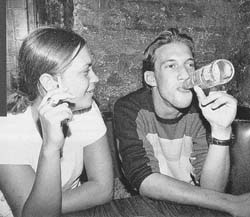
Intoxicating Culture ClashBy Gwendolyn Holbrow What is wrong with this picture? It’s Saturday night and the pubs lining the cobbled streets of Sachsenhausen are hopping. Their dim smoky interiors throb to the beat of live music and karaoke as patrons from 16 to 60 sidle past one another, jockeying for seats, searching for friends and lining up to order another glass of beer. Native Germans would probably find nothing at all wrong with such a picture, but new arrivals from other lands are often alarmed by the young age of the drinkers. Beer and wine are legally available from age 16 (in practice much younger) and spirits from 18. Americans in particular, accustomed to their 21 drinking age, are usually horrified if they are parents of teenagers, or thrilled if they are teenagers themselves. Fortunately, both groups tend to calm down after some experience with the new freedom. “When I first got here, I was shocked that parents let their kids do this,” says American mother Debra Trilhaase. “But other parents said just wait. Now I think in some ways these kids are better prepared for college, not as hell-bent on getting high.” The teens themselves agree strongly, claiming that, after an initial binge period, they become more responsible in their use of alcohol than their friends back home. “In the US, it’s more attractive because it’s not allowed,” says 18-year-old Michael Kobold, who returned to Germany from the US two years ago. “Here kids may go overboard at first. It’s a novelty that wears off after six months to a year.” Research backs him up. According to the US-based National Institute on Alcohol Abuse and Alcoholism, most young adults mature out of abusive drinking, and this process can be accelerated by reducing the risks and consequences of youthful drinking. In Germany, this is achieved in part by postponing the age of driving to 18. “I think it’s very sensible to have then drink before they learn to drive,” says American mother Marline Holmes. “They get it out of their systems.” And it’s not as if teenage drinking isn’t going on back home. Parents and teens alike agree that there is a booming business in fake identification in the US, and underage drinking is also widespread in Great Britain, where the drinking age is 18 but citizens do not carry identification cards, so no verification of age is required. The Australian drinking age is also 18, but is often ignored. Says mother Bev Grigg, “Personally, I find it better for 16-year-olds here. In Australia, the kids have house parties and they don’t stop, they just go blotto. You don’t see that here.” The Frankfurt International School (FIS), with its student body drawn from over 50 nations, treads delicately among the various cultures on the subject of teenage drinking. Alcoholic beverages are served to high school students at two formal dances yearly, with written permission from their parents. According to FIS marketing director Adele Hodgson, most do receive permission, and she feels the policy works well. “You can ban it and drive it underground, or you can allow it under our control. The key is supervision and the fact that the faculty knows the individual students.” Naturally, not every parent agrees. Alcohol is a powerful drug which affects physical and mental development, diminishes the ability to make wise decisions, and is a frequent contributing factor in deaths by fire, drowning, choking, suicide, murder and of course alcohol poisoning. “I think parents have a false sense of safety,” says Jo Ann Roesch, formerly a school health director in the US. “You don’t have to be in a car to have serious problems. There is a need for continuing education concerning the risks associated with alcohol consumption. My personal opinion is that 16 is too young to make an informed decision.” Unsurprisingly, most 16-year-olds feel otherwise. Asked what his friends back in the US think of the German system, 16-year-old Brian Wolf smiles. “They all want to come and visit,” he says. “They think it’s paradise.” |